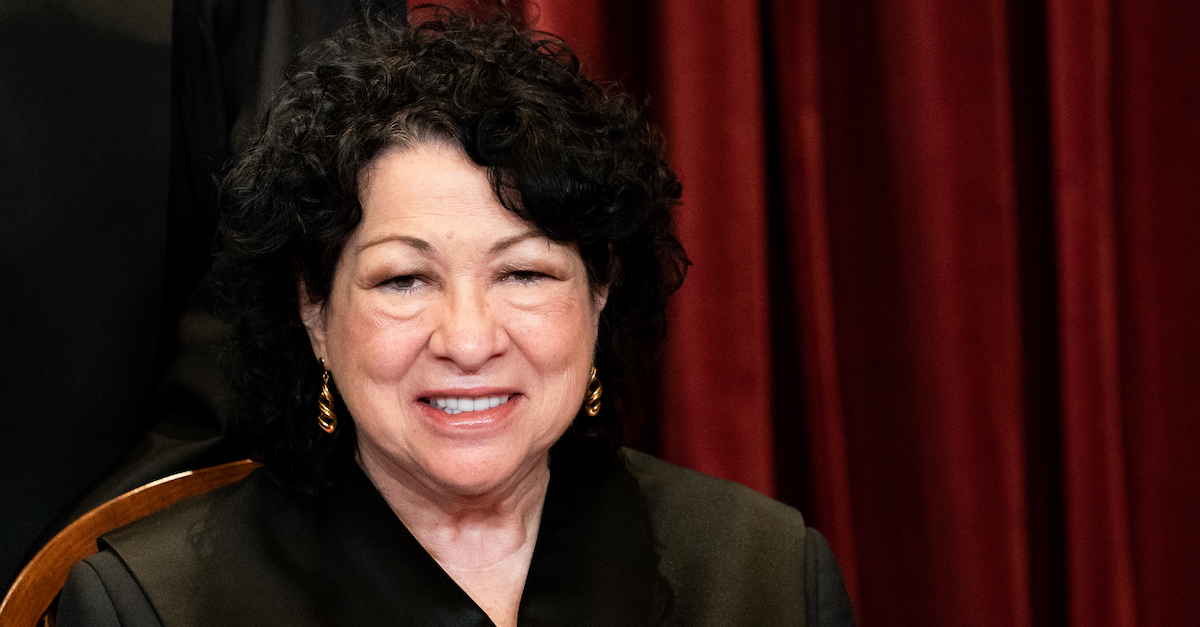
Associate Justice Sonia Sotomayor sits during a group photo of the Justices at the Supreme Court in Washington, D.C. on April 23, 2021.
The often-fractured Supreme Court of the United States ruled unanimously in favor of a domestic violence victim who sought to protect her son by keeping the child in the U.S. instead of returning him to his father in Italy. The high court’s decision is not a permanent ruling that the child will stay in the U.S.; rather, the justices set out a framework for trial courts to use in certain international custody disputes, and the subject child may remain here until the trial court applies that newly-clarified analysis to the case.
Justice Sonia Sotomayor delivered the opinion of the court in the case stylized as Golan v. Saada, the case involves a subject child known in court documents as “B.A.S.,” who was born in Milan, Italy in 2016.
The child’s mother is Narkis Golan, a U.S. citizen, and his father is Isacco Saada, an Italian citizen. Saada and Golan married in 2015, and according to district court findings, Saada became habitually violent toward Golan, and often in front of the child.
Although the trial court found that B.A.S. was not the target of Saada’s violence, it found that the incidents B.A.S. witnessed were “chilling” and detrimental to the chid’s cognitive and social-emotional development. According to court records, Italian social services agencies also determined that B.A.S. had been exposed to dangerous violence.
In 2018, when B.A.S. was two years old, Golan traveled to the United States to attend her brother’s wedding. She never returned to Italy, and instead opted to live in a domestic-violence shelter in New York with the child.
After Golan failed to return to Italy, Saada filed a case in federal court in New York to force Golan to return B.A.S. to Italy under the rules of the 1980 Hague Convention on the Civil Aspects of International Child Abduction. The Hague Convention mandates that custody disputes are resolved in the country of the subject child’s residence, so as to prevent parents from fleeing to foreign countries to obtain a legal advantage. However, the Hague Convention allows an exception for cases in which there is a “grave risk” that returning to the home country would cause physical or psychological harm to a subject child.
The district court ruled that B.A.S. could be returned to Italy so long as protective measures were put in place (such as Saada’s attending therapy and parenting classes, paying Golan’s living expenses, and the couple living separately). On appeal, the U.S. Court of Appeals for the 2nd Circuit affirmed, and found that the district court had not erred in interpreting the Hague Convention to require consideration of the protective measures.
Golan appealed and argued that the district court should not have even considered the imposing of protective measures as a mechanism to return B.A.S. to Italy. The Supreme Court’s role was not to opine on B.A.S.’s safety, but rather to review the legal framework used by the lower courts in making their assessments.
Sotomayor first examined the text of the Hague Convention, and found that nothing in the text “either forbids or requires consideration of ameliorative measures” as a trial court exercises its discretion. She clarified that if the parties raise potential ameliorative measures, the court should usually consider them in its analysis of risk. Moreover, Sotomayor added, “any consideration of ameliorative measures must prioritize the child’s physical and psychological safety.”
She explained that some “intolerable situation[s]” (such as, for example, the risk of sexual abuse) are simply so severe that a court may decline to consider any measures that would help return the child to their home country. Domestic violence can constitute just such a risk, ruled the Supreme Court. Sotomayor wrote:
Other physical or psychological abuse, serious neglect, and domestic violence in the home may also constitute an obvious grave risk to the child’s safety that could not readily be ameliorated. A court may also decline to consider imposing ameliorative measures where it reasonably expects that they will not be followed.
Furthermore, ruled the justices, if a trial court is to consider any ameliorative measures, it needs to do so in a timely manner to comport with the Hague Convention’s requirements for “expeditious” proceedings for the return of children.
“Consideration of ameliorative measures should not cause undue delay in resolution of return petitions,” Sotomayor wrote.
Turning more specifically to the facts of B.A.S.’s case, the justices found that the appropriate outcome was to remand the case back to district court. Because the 2nd Circuit “improperly weighted the scales in favor of return” by failing to even consider that the case might be one for which ameliorative measures were entirely inappropriate, the proper remedy is a complete reconsideration of the risk posed to the child.
The Supreme Court was not blind to the fact that the lengthy appeals process has already caused significant delay.
“The delay that has already occurred, however, cannot be undone,” the justices found, reminding the district court that it is expected to “move as expeditiously as possible to reach a final decision without further unnecessary delay.”
Golan v. Saada was one of several cases decided on Wednesday, two of which were unanimous.
Editor’s Note: This story was updated post-publication to clarify the immediate impact of the Supreme Court’s ruling and what is to come next in the case.
[Image via Erin Schaff-Pool/Getty Images]
Have a tip we should know? [email protected]